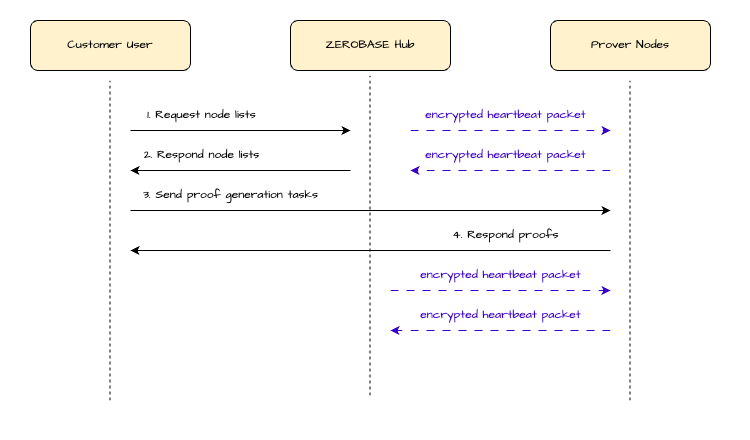Workflow

ZEROBASE Hub
The ZEROBASE Hub serves as the central coordination module of the ZEROBASE network. It is responsible for broadcasting verification tasks, dispatching Prover nodes, handling user proof requests, and managing node communication. Before submitting a zero-knowledge proof (ZK-SNARK) request, users must first register their task with the ZEROBASE Hub. Once the task is registered successfully, the Hub broadcasts it across the ZEROBASE network. Prover nodes that respond within a specified time window are added to a candidate pool, from which a subset is randomly selected to perform the proof generation.
The core responsibilities of the Hub include maintaining a list of active nodes in the network, generating connection credentials for these nodes, processing heartbeat packets sent by them, and responding to client requests for node information. When a client initiates a request, the Hub selects four available nodes from the node pool and returns their connection details. The Hub also handles payment-related workflows. When a client initiates a proof request that involves payment, it sends an HTTPS request to the Hub to create a new order. The Hub generates a unique order ID using a UUID algorithm and returns it to the client. During the verification phase, the client sends the order ID back to the Hub, which distributes it to the selected Prover nodes and returns their connection information to the client.
Prover Node
Prover nodes in the ZEROBASE network are the computational entities responsible for generating ZK-SNARK proofs. Each node receives input data from clients, executes the designated circuit computations, and returns the resulting proof via the ZEROBASE API. These nodes periodically send heartbeat packets to the Hub containing their current status and RSA public key, enabling the Hub to track node availability in real time. Prover nodes support two operating modes: a basic mode and a payment-verified mode. In the basic mode, the node directly computes the proof and returns it upon receiving input data. In the payment-verified mode, the node first interacts with a smart contract to confirm whether the order has been paid. Only after successful verification does it proceed with the computation.
The security of the entire communication system depends on the confidentiality of connection credentials, especially the integrity of public keys. Meanwhile, the stability of nodes and the responsiveness of task scheduling are ensured through the regular transmission of heartbeat packets. Through this layered architecture, ZEROBASE achieves high-performance, trustless coordination and scheduling of ZK computation tasks.